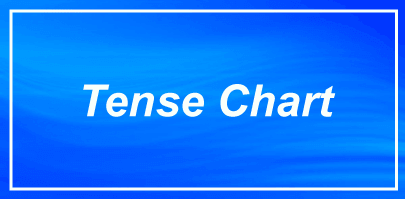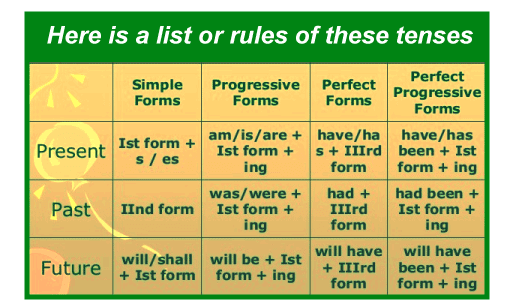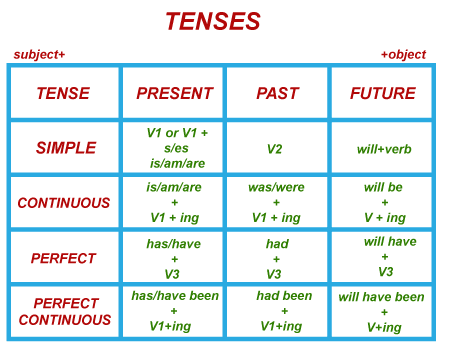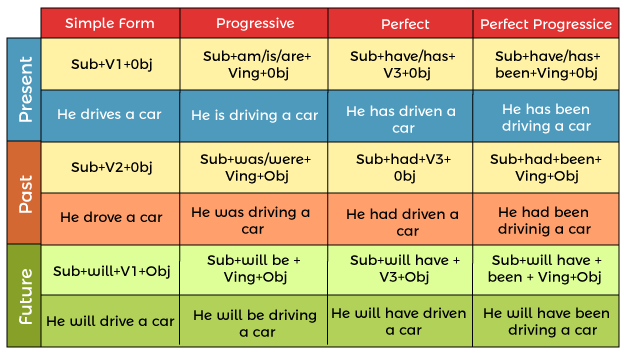Tenses Chart
Tenses are an important component in the English language that refers and implies to the time reference. Tenses are often expressed by the employment of various verb forms, notably in their conjugated patterns. The past, present, and future tense are common in several language. Tenses are used to convey time in relation to the moment of speech. Expressions of tension are frequently linked with expression of the type of aspect; they are often referred to as tenses.

Are you a beginner when it comes to tenses?? You're looking for a place where you can master all the tenses. Then you are at the right place, a basic tense chart with rules and examples below.
It makes it easier to recall all of the rules and formulae. This chart may be stored offline for learning in your leisure time.
Types Of Tenses
Present Tense
- Present Indefinite or Simple Present Tense
- Present Continuous Tense
- Present Perfect Tense
- Present Perfect Continuous Tense
Past Tense
- Past Indefinite Tense
- Past Continuous Tense
- Past Perfect Continuous Tense
- Past Perfect Continuous Tense
And last but not the least is the
Future Tense
- Future Indefinite Tense
- Future Continuous Tense
- Future Continuous Tense
- Future Perfect Continuous Tense

Now on the basis of the above table on types of tenses, let's have a look at the basic chart or table for the same;
| Tense |
Present |
Past |
Future |
| Simple |
He drives a car |
He drove a car |
He will drive a car |
| Continuous |
He is driving a car |
He was driving a car |
He will be driving a car |
| Perfect |
He has driven a car |
He had driven a car |
He will have driven a car |
| Perfect Continuous |
He has been driving a car since morning |
He had been driving the car since 7.am. |
He will have driving a car at 6 am tomorrow. |
Present Tense
| Tenses Names |
Examples |
Present Indefinite Tense (Affirmative)
Present Indefinite tense (Negative)
Present indefinite tense (Interrogative)
Present indefinite tense (Question- Word) |
He drinks.
He does not eat.
Does he drink?
Why does he drink? |
Present Continuous tense (Affirmative)
Present Continuous tense (Negative)
Present Continuous tense (Interrogative)
Present Continuous tense (Questions-word) |
She is studying.
She is not studying.
Is she studying?
Where is she studying? |
Present perfect tense (Affirmative)
Present perfect tense (Negative)
Present perfect tense (interrogative)
Present perfect tense (Question word) |
I have eaten.
I have not eaten.
Have I eaten?
When have I eaten? |
Present perfect continuous tense (Affirmative)
Present Perfect Continuous Tense (Negative)
Present Perfect Continuous Tense (Interrogative)
Present Perfect Continuous Tense (Question word) |
Has he been calling for 3 days?
He has been calling for 3 days.
He has not been calling for 3 days.
Why has he been calling for 3 days |

Past Tense
Past Indefinite Tense (Affirmative)
Past Indefinite Tense (Negative)
ast Indefinite Tense (Interrogative)
Past Indefinite Tense (Question word) |
I ate.
I did not eat.
Did I not eat?
When did I eat? |
Past Continuous Tense (Affirmative)
Past Continuous Tense (Negative)
Past Continuous Tense (Interrogative)
Past Continuous Tense (Question word) |
She was dancing.
He was not dancing
Was he dancing?
When was he dancing? |
Past Perfect Tense (Affirmative)
Past Perfect Tense (Negative)
Past Perfect Tense (Interrogative)
Past Perfect Tense (Question word) |
I had slept.
I had not slept.
Had I slept?
Where had I slept? |
Past Perfect Continuous Tense(Affirmative)
Past Perfect Continuous Tense (Negative)
Past Perfect Continuous Tense (Interrogative)
Past Perfect Continuous Tense (Question word) |
She had been studying since Sunday.
She had not been studying since Sunday.
Had she been studying since Sunday?
Why had he been studying since Sunday? |
Future Tense
Future Indefinite Tense (Affirmative)
Future Indefinite Tense (Negative)
Future Indefinite Tense (Interrogative)
Future Indefinite Tense (Question word) |
She will go to college.
She will not go to college.
Will you go to college?
Why will you go to college? |
Future Continuous Tense (Affirmative)
Future Continuous Tense (Negative)
Future Continuous Tense (Interrogative)
Future Continuous Tense (Question word) |
We will be singing.
They shall not be singing.
Shall we be singing?
When shall he be singing? |
Future Perfect Tense (Affirmative)
Future Perfect Tense (Negative)
Future Perfect Tense (Interrogative)
Future Perfect Tense (Question Word) |
He will have studied.
He will not have studied.
Will they have been studied?
When will they have been studied? |
Future Perfect Continuous Tense (Affirmative)
Future Perfect Continuous Tense (Negative)
Future Perfect Continuous Tense (Interrogative)
Future Perfect Continuous Tense (Question word) |
He will have been travelling for 3 days.
He will not have been travelling for 3 days.
Will he have been travelling for 3 days?
Why will he have been travelling for 3 days? |

| 



 For Videos Join Our Youtube Channel: Join Now
For Videos Join Our Youtube Channel: Join Now










